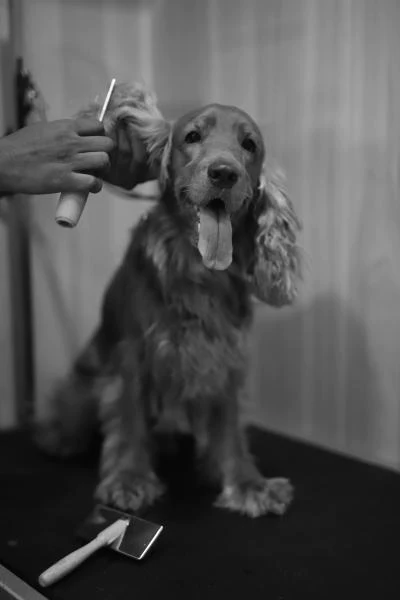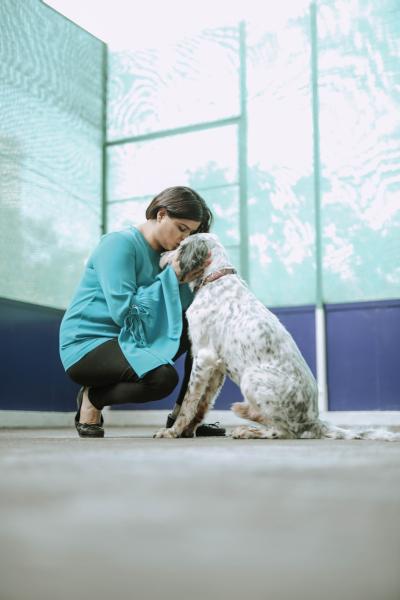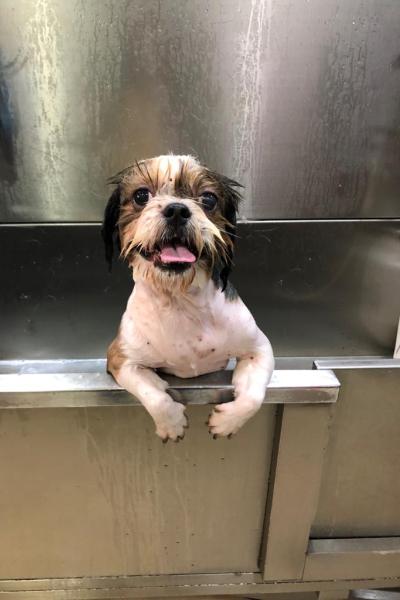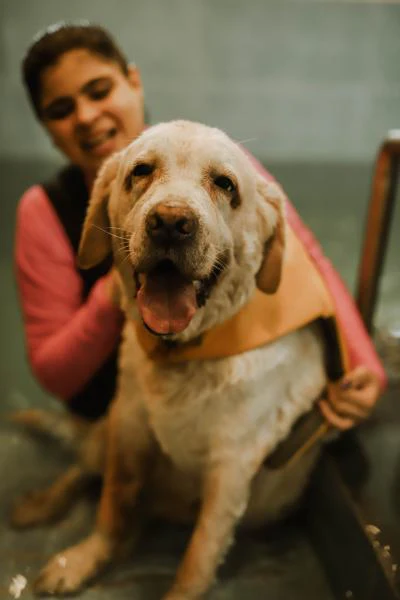Pooja Advani’s dog spa and kennels in Mumbai is ahead of its time. Her next challenge: tackling dog abandonment in India’s largest city.
Photos courtesy of Pooja Advani
The prism through which we see dogs, indeed all animals, depends much on the state of wider economic development. The richer a country in nominal terms, the more complex our relationship with animals, both domestic and wild, tends to be. Look beyond obvious questions like ‘should we eat them’, and a more complex philosophy emerges.
Are dogs mere ‘furry companions’ who happen to love us, and we them, by dint of thousands of years of domestication and co-dependency. Or are they real family, or as close to being so classified as two non-related mammalian species can be.
And if that is the case, do we not have a duty of care to all of them? Stray dogs can and do live wild on the streets in many countries, but a dog born in captivity, or bred to suit human purposes, is likely to struggle on the streets. Abandoned and left to their own devices, without companionship, a home, a pack, most die.
This truism – for it surely is – occurred to your correspondent during a visit to Pooja Advani’s Doggiie Dog World in the Mumbai suburb of Andheri. Opened in 2014, the place triples up as a vets, a doggie day spa, and a kennels. A fast-talking 27-year-old Mumbaiker with an inner battery that could power a small town, Advani spent the first 18 years of her life trying to save every stray animal she came across.


The place triples up as a vets, a doggie day spa, and a kennels
Aged five, she discovered a kitten, barely more than a few days old, cowering in a drainage ditch near her home. She rescued it and put it in her parents’ mailbox, feeding it milk and cookies twice a day. “My Mum found out,” she says. “I thought she’d be angry, but instead her reaction was measured. She told me: ‘You know, you can’t save every animal out there’.”
Nonetheless, Advani tries. Her parents grew accustomed to finding a new stray dog cluttering up the hallway each time they got home. She’d show up at the nearby vets with a dog with a limp or a scar and cajole them into helping. “I didn’t have any money to pay them, but I always found ways to lean on their charity,” she says.
It worked until, aged 16, she found a litter of eight puppies trapped in a muddy concrete drain outside her high school. The mother was in pain, having been bitten by a python, and the pups were dying. It took her four hours to dig a channel to them, and by the time she emerged, she was covered in fleas and ticks.
Life can be hard, and karma spends much of her precious time looking in the wrong direction. The mother and the litter died, and Advani had to ask herself some hard questions. Such as: did she want to martyr her own life by taking care of every animal that staggered her way? Psychologists call this the ‘Saviour Complex’. Stress, burnout, and a lot of physical and mental pain almost certainly lie along that path.
So Advani did what many of us do when a childhood dream dies, burying herself in academia, and focusing on subjects as far removed from animals as possible. She studied at GIA India, the world’s foremost authority in gemstones, then shifted gears again, applying for an MBA course in marketing at Deakin University in Melbourne.
But before she started the course, fate intervened. During a visit to Singapore, she visited a pet spa called ‘The Wicked Wag’. It embodied everything she imagined when, as a seven-year-old, she told her Mum she wanted to grow up “living in a big house full of pups”. The ‘Wag’, run by local couple Tim and Ivy, offered ‘day-care for “furkids”’, dog grooming, an in-house vets, and long-term kennels. She cancelled her course, flew home to Mumbai, and began to plan.
Advani’s parents, while far from wealthy, owned a plot of land on Jankidevi School Road, a nondescript part of Andheri hemmed in by mangrove swamps. She borrowed some money from her father, took out a bank loan, and got to work. When ‘Doggiie Dog World’, named after the Snoop Dogg song, opened its doors in May 2014, it was everything she imagined. Expanded and improved over the years, it is now a 2,500-square-foot operation, with a dog-grooming room and a team of in-house vets at ground level, and a long-term kennels on floors one and two.

Mangrove swamps
When Dudley & Co swings by for a chat on a wet July day, we find Pooja trying, as usual, to juggle a hundred things at once. Apu, a seriously sweet Shih Tzu with a smile that stretches from ear to ear, is enjoying a shower, while Noodle, a Golden Retriever, fake-grins his way through a blow-dry. “He doesn’t like it much,” she says. Maggie, a blind 11-year-old Bull Terrier, keeps bumping her nose as she bumbles around the lobby, in search of a snack and a stroke.
There is so much to admire about Doggiie Dog World. Mumbai still has very few long-term kennels and boarding houses, and still fewer that are air-conditioned, and with a UV-sterilised plunge pool. This is world-class stuff, but it’s a stray and frankly saddening comment about some of her doggie stay-cationers that sticks in my head.
To circle round to the original point, India’s relationship with dogs, as it develops and changes as a country, is enduring growing pains. City streets are flooded with strays, and have been for centuries. But many of the dogs you see wandering Mumbai’s alleyways are born in ‘puppy mills’, where bitches are bred until they cannot stand, and where ‘faulty’ dogs no one wants are thrown onto the streets.
But is that worse than the sheer number abandoned by owners who realise, too late, that welcoming a dog into their house isn’t easy? It reminds me of a British TV advert from the 1970s with its strapline: ‘A dog is for life, not just for Christmas’. That was a response to the number of pups bought as Christmas presents, then left in parks and on street corners before the year was out. Unscrupulous dog breeders still exist in the UK, and dogs are still abandoned, but the problem has been tempered.
Not so in India, which is undergoing the same moment of crisis and change. “The big companies have a lot to answer for,” says Advani. “When Vodafone ran an ad campaign fronted by a sweet looking pug, people ran out to buy pugs.” Likewise, there was an explosion of interest in Northern Inuit Dogs, thanks to the ‘direwolf’ in the hit TV show Game of Thrones. Mumbai’s streets were suddenly filled with abandoned pugs and huskies.
And if abandoning a domesticated dog is bad enough, what of the low-lives who do so at establishments like Advani’s. She describes it as an “epidemic”, and the word is not lightly used. Four of the dogs living in the first floor kennels were either dumped there, or had owners utterly disinterested in the animal’s wellbeing.
Take Tyson, a Mastiff first brought in when he was three months old. “His owner would leave him with us for day boarding, and return in the evening. He always paid, but he was almost never here. After ten months, I did a count. In seven months Tyson had been home for just six days.” She called in the owner, sat him down, and handed over a sheaf of adoption papers. “I told him Tyson was going to live here from now on. He agreed, signed, and left.” When I meet Tyson, gruff and territorial but with a heart of gold, he is a week away from moving in with his new adoptive owner, an older lady who has always lived with Mastiffs.


Advani is on a mission to make the lives of dogs better in India
Sam, a ten-year-old Golden Retriever, is a more complex case. He was five years old when his owners arrived, paid for a month’s worth of kennelling, then disappeared off the face of the earth. “Their ID cards and rental agreement were fake. They were from the US or Canada, but despite working with authorities in both countries, I never tracked them down,” she says. No one adopted him, so over time, he became the de facto ‘hound of the house’, a situation that makes Advani grow quiet and sad. “He didn’t take to my dogs at home, nor they to him, so he has stayed here.”
His life at Doggiie Dog is a good one, and is surely preferable to being out on the street. Do pups having an in-built doggie version of Maslow’s hierarchy of needs? Sam is not unhappy. But is he content? I think even Advani doesn’t know, and when we discuss him it makes her heart well. For a moment, she’s a five-year-old hiding a kitten in her parents’ mailbox with a saucer of milk.
Advani is on a mission to make the lives of dogs better in India. A gritty documentary called ‘Overlooked’, about the growing crisis of strays, will be released in September. She now strictly vets – excuse the pun – new customers, overloading them with paperwork. “The ones who complain about our bureaucracy are the ones most likely ‘dump and dash’, she observes tartly.
Like many in her line of work, she is constantly appealing to those in power to clamp down on illicit dog breeding, abandonment, animal cruelty – the whole shebang. “Do you know the fine for animal torture in India,” she asks. “It is 50 Rupees [the equivalent of 58 pence, or 72 US cents]. That hasn’t changed since 1958.”
In crazy, wonderful, maddening, effervescent, incredible India, so much is changing, so fast. But it’s worth pausing to reflect that this is also an overwhelmingly Hindu country that sees the cow as a sacred symbol of life to be protected and revered. As Advani shows and says, in her actions and in her eloquent arguments, it is time, surely, to extend that level of respect to our four-legged friends.
July 2022
July 2022
July 2022